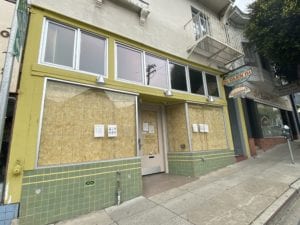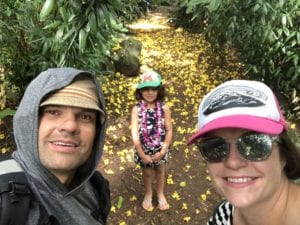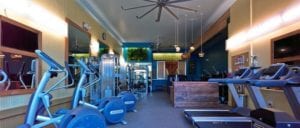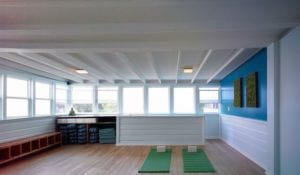
Photo: Bonnee Waldstein
In a pandemic, when it comes to working out in a gym to stay fit or practicing yoga in a studio, we’re on our own. Glen Park has been lucky to have had several options close by.
For example, there’s Synced Pilates on Chenery Street; Sunrise Health and Fitness, also on Chenery Street; and Sol Gym on Diamond Street. Each business offers different services, especially with the Covid-19 situation.
The fitGLENfit gym on Chenery Street has been a popular small neighborhood gym since it opened in 2013. Sunporch Yoga, under the same business umbrella, has its studio space there too. A second gym, fitBERNALfit, on Cortland Avenue, opened in 2009.
The website for all locations is www.fitlocalfit.com.

All of these facilities were founded and are owned by Dean Eriksen, 44, and Jeanne Eriksen, 42. With their eight year-old daughter, Charley, they divide their time between Grass Valley and San Francisco.
Throughout the years, business was growing and thriving. Trouble began the last week of February when Covid-19 became a clear threat. Dean Eriksen took many additional steps in the way of keeping the gyms sanitized and began rethinking operations. He started to get deluged with questions from gym members about precautionary measures and the status of their membership.
On March 16, everything changed definitively, for everyone. The gyms had to close, along with other businesses deemed nonessential.
At first it seemed like it might be a short term glitch, as the pandemic would get under control. But as time has passed and conditions loosened for some types of businesses, gyms have remained shuttered by city decree.
To complicate matters further for the Eriksens, they are four years into the process of developing a third gym location, in the Outer Sunset. The project is ninety percent completed, but further progress is at a standstill.
It’s been a definite challenge, causing them to tap deeply into their financial resources. “Keeping up on payments for three locations and other related costs is daunting,” says Eriksen. “Even though they’re closed, we’re faced with a number of operational expenses to retain memberships and general business practices.”
In order to promote a phased reopening of his gyms, and those in San Francisco generally, Eriksen and a number of other businesses joined forces to develop a strategy to get their voices heard by the city and their message out to the public.
They formed an organization—the San Francisco Independent Fitness Studio Coalition– of around sixty fitness businesses to lobby the city, including the mayor’s office, the Office of Economic Workforce Development, and the Department of Public Health. They’ve had several interactions thus far.
They presented a full-blown model they’d developed for ensuring a safe environment, at every step, that exceeds state requirements for fitness centers. They’ve detailed, for example: a member reservation system, enforced occupancy limits, face covering requirements, workout zones incorporating physical distancing, strict sanitizing practices before and after equipment use, enhanced ventilation systems, and contact tracing procedures if a member reports exposure.
Small independent gyms and fitness centers are treated the same way as big box gyms regarding reopening strategy, which is holding them back, despite their ability to alter their procedures to operate more safely.
For more information on the Coalition and the issues surrounding reopening: https://sfist.com/2020/07/29/workout-studios-and-boutique-gyms-push-back-on-sf-reopening-delay/
The Glen Park Merchants Association has been helpful, notes Eriksen. They’ve kept the neighborhood business owners informed about city initiatives and available government relief funds, as well as information from the state and the federal government.
All the staff has been let go, except for the manager, Jim Wolff. Fortunately, many of them had other plans anyway. When the gyms do reopen, staff will be needed one hundred percent of the time to cover both locations at reduced occupancy. There will need to be dedicated staff to roam about, keeping equipment sanitized before and after use. Other staff will be checking in members at the front door and distributing equipment. Access will be for members only, with no option for a drop-in session by nonmembers.
Members will also get a perk — their own cleaning kits.

Eriksen has been busily reconfiguring the gym spaces for the new reality.
While the facilities remain closed, membership dues have been suspended, unless the member has offered to continue being billed. To help fill the workout gap, the gyms offer livestream classes. Close to the Bernal location, Rec and Park has allowed them to conduct free outdoor circuit training in Holly Park on Wednesday mornings. However, Rec and Park isn’t issuing permits for outdoor training in Glen Canyon Park at this time.

Membership in one gym includes access to the other, so Glen Park members can take advantage of this activity. The city charges fifteen dollars per hour for the permit, and there are other related expenses, so this isn’t a revenue generating service.
Despite the many proposed labor intensive workarounds during the pandemic, there’s no substitute for the pre-Covid indoor gym experience. With the rainy season approaching, outdoor alternatives will become limited. The wildfire season will bring air quality challenges. In any case, many people with health issues cannot exercise outdoors; many gym members join mainly to use treadmills and other heavy equipment which can’t be used outdoors; and many streets in San Francisco aren’t conducive to sharing space in this manner.
Right now, with the measures their coalition is suggesting, Eriksen is frustrated by what he feels is the city’s misunderstanding of the risks and benefits of phased reopening of the gyms. He thinks the city has a misinterpretation of gym safety. As to why the city is taking its position, Eriksen answers, “I honestly don’t know. Pre-Covid, gyms were a completely different operation. Post-Covid, we’ve addressed all of the risk points identified to date.”
He explains that, whereas barbershops, nail salons, and massage therapy and tattoo parlors would have been allowed to operate as of July 29 while gyms were not (the July 29 deadline has passed with no action), those facilities have a high degree of person-to-person contact. Gyms have more flexibility in limiting such contact, and most activities don’t involve physical contact with another person. The coalition is pushing for a minimum one-to-one ratio of personal trainer to member to be included in this phase of reopening.
Other things seem backwards to Eriksen. Bars and restaurants were allowed to reopen with restrictions but gyms were not. Those establishments, even with outdoor service, potentially expose the general population in a less controlled environment, while membership gyms and fitness centers at least have limited, identifiable patrons, with activities that can be done one-on-one or in small groups.
Eriksen thinks because bars and restaurants generate significant revenue for the city through taxes, permits and licenses, perhaps that is why the city moved to reopen them before other businesses?
The coalition has engaged a law firm that submitted a formal public records request to the city for documentation and scientific evidence that a gym cannot be a safe environment with the proper measures. By law, a city agency must respond to such a request within ten days.
On the state level, there are guidelines for phased reopening and counties are evaluated every three weeks for compliance. If they don’t meet standards, reopening can be rescinded. As of now, San Francisco county is on the watchlist. Eriksen and the coalition want to be prepared to quickly reopen with city government approval should San Francisco be taken off the watchlist.
Senator Wiener supports the efforts of the coalition and is trying to get meetings for them with public health, the mayor’s office and the workforce development office.
There hasn’t been any indication of when reopening of gyms will be possible. That adds to the uncertainty Eriksen and his colleagues are facing: “Fitness centers and gyms are not even mentioned in public releases other than to be included in ‘later reopening phases.’ That causes a negative perception among the public that these businesses are of extreme high risk and are not to be considered, protocols or not. Why is the city not considering this business sector to the extent it has done so for others?”
Exercise is an important way to boost the immune system, Eriksen says. One of the coalition’s goals is that small independent gyms be recognized as an essential health and wellness business. Then, when the next pandemic or closure for any reason hits, they’d be identified correctly as to the service they provide. In many cases, gyms and fitness centers provide personal training in the physical rehabilitation continuum, adding further justification for the coalition’s position.
Eriksen says that giving back, both locally and globally, have played a key role in their business model from the beginning. They donate fitness packs for school auctions; donate fire relief funds to impacted towns; support Youth Rise, in which students receive yoga instruction; and Music Together, a toddler music class.
In addition, FitGLENfit has been in Glen Park for seven years. It was the first GREEN gym and studio designated by the San Francisco Department of the Environment.
One might think Eriksen has time on his hands while the gyms are in their frozen state. But there’s been a lot to do. They’ve deep cleaned and repainted the gyms, redefined the overall layout and relocated or removed equipment.
“We need help from members and the community to have the opportunity to serve going forward. We need to have a chance for our business to survive,” says Eriksen. He asks that people who wish to help reach out to Supervisor Mandelman to support a phased reopening (in a safe manner) of small neighborhood gyms and studios. They also have a website that outlines the needs of their business sector: https://savesanfranciscosmallbusiness.com/
In the meantime, Eriksen encourages everyone to focus on their health and well-being.
One thing is for sure: When the green light goes on, fitGLENfit will be ready.